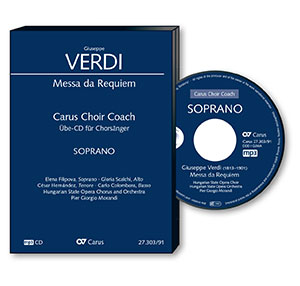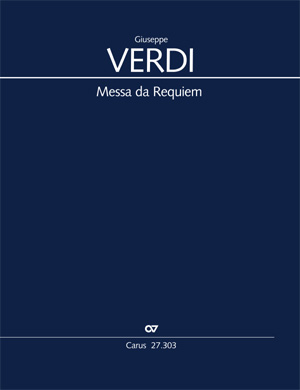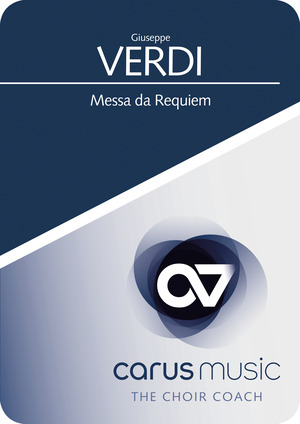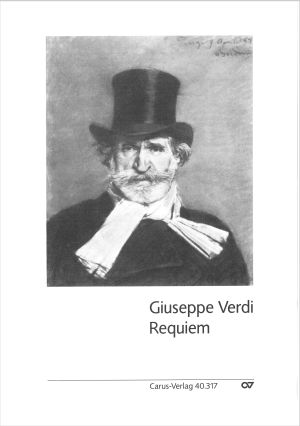
Verdi’s Requiem is one of the major works in this genre in the 19th century. It demands just about everything of the choral singer: rapidly-changing harmonies, also in distant keys, and some tremendously fast tempi serve the liturgy, to which drama is added by musical means. The apocalypse has never sounded more beautiful than in the famous "Dies Irae"! But each choral singer must be in good voice so that he or she can give expression to the fear of damnation and the hope of redemption in equal measure.
The Carus Choir Coach offers choir singers the unique opportunity to study and learn their own, individual choral parts within the context of the sound of the entire choir and orchestra. For every vocal range a separate Audio CD or MP3 and download containing each choir part is available. The Carus Choir Coach is based on recorded interpretations by renowned artists who have performed the work from carefully prepared Carus Urtext editions. Each choir part is presented in three different versions:
- Original recording
- Coach: each part is accompanied by the piano, with the original recording sounding in the background
- Coach in slow mode: the tempo of the coach slows down to 70% of the original version – through this reduction passages can be learned more effectively.
Performers: Elena Filipova (soprano), Gloria Scalchi (mezzo-soprano), César Hernández (tenore), Carlo Colombara (basso) – Hungarian State Opera Choir, Hungarian State Opera Orchestra – Pier Giorgio Morandi
Purchase
Additional product information
-
Composer
Giuseppe Verdi
| 1813-1901Giuseppe Verdi was born in Le Roncole on the 9th October 1813, the son of an innkeeper and small-scale farmer. Although he grew up in poor circumstances his extraordinary musical talent was soon recognized and he received organ lessons, then – assisted by a patron – he entered the Busseto Gymnasium. His benefactor Antoni Barezzi continued to assist him privately after the Milan Conservatoire had refused him admission. Following some years as organist and director of music in Busseto he made his breakthrough in Milan with the premiere of the opera "Nabucco" in 1842. The works which he wrote after 1850 are still among the principal pillars of the opera repertoire. Personal details
-
Ensemble
Hungarian State Opera Choir
-
Ensemble
Hungarian State Opera Orchestra
-
Conductor
Pier Giorgio Morandi
-
Soloist - soprano
Elena Filipova
-
Soloist - mezzo-soprano
Gloria Scalchi
-
Soloist - tenor
César Hernández
-
Soloist - bass
Carlo Colombara
Frequent questions about this work
 There are no questions and answers available so far or you were unable to find an answer to your specific question about this work? Then click here and send your specific questions to our Customer Services!
There are no questions and answers available so far or you were unable to find an answer to your specific question about this work? Then click here and send your specific questions to our Customer Services!






